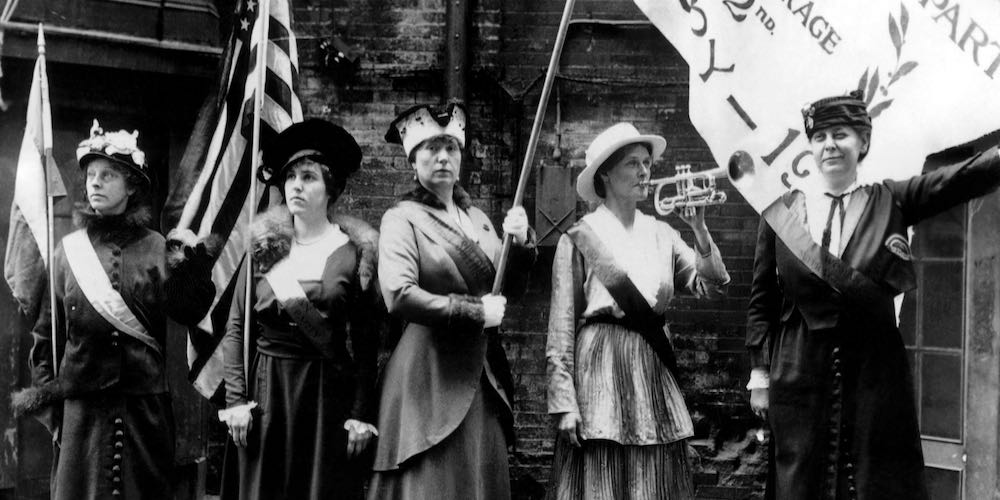Capacious liberalism is the prerequisite for successful, empirically based social reform and the rule of law.
Moms on the Warpath
American mothers have a history of political activism. This is hardly a golden age of maternal activism, mainly visible in the relentless television-commercial-monitoring of One Million Moms, or in Portland’s “Wall of Moms,” which enjoyed a brief spotlight moment before crumbling under allegations of “anti-blackness.” Earlier eras have seen mothers rallying to weightier causes, such as supporting the American Revolution, attaining women’s suffrage, or launching the temperance movement. As vessels of life and defenders of children, matrons can command their own kind of moral authority. The world has been needing that influence of late, as kids are deluged by successive waves of lunacy: nonsensical Covid policy, transgender activism, and ideology-drenched school curricula.
Bethany Mandel and Karol Markowicz are ready to seize the moment. Their new book, Stolen Youth, urges American parents to band together against a youth culture saturated in toxic ideology. They are enraged by the way that our kids’ welfare has been sacrificed repeatedly to the gods of politics. Even organizations explicitly created to protect our children’s interests, such as the American Academy of Pediatrics, showed their true colors during the Covid pandemic when they willingly took kids’ needs right off the table in deference to frightened seniors. Culture wars ebb and flow, but lately it feels like the kids are constantly losing, and these moms have had it.
Mandel and Markowicz are both opinion writers with connections to Fox News, the New York Post, and other major right-wing outlets. Their book is every bit as polemical as one would expect, and perhaps less humorous than their Twitter followers might have hoped. As I will shortly explain, I think they have somewhat misdiagnosed the deeper causes of the problems they decry. Nevertheless, I felt deep sympathy as I moved through the chapters of Stolen Youth.
This really isn’t my kind of book, as a writer, I try not to trade too heavily in partisan anger. In a way though, that’s why I read it. I have a strong aversion to activism, generally advising my fellow Americans to spend more time tilling fertile soil and less “draining swamps.” My impulse is to view insane ideologues like tantrum-throwing toddlers, and I favor the same strategy for both: just let them exhaust themselves, and they’ll sleep like logs. But I know that this philosophy strikes many of my contemporaries as naïve do-nothingism, and I’m prepared to entertain alternative perspectives. I recognize that Mandel and Markowicz are quite different from those feckless, pie-in-sky drifters who use hysterical causes as a substitute for meaningful life pursuits. They’re matron-activists. They’re mama bears. And unfortunately, they don’t really exaggerate the problem by all that much. Americans are failing our kids in some catastrophic ways.
As a mama bear myself, I understand this. Polemical base-beating isn’t my thing, but I’ve watched Netflix and examined our local school district. Those people are nuts, and I’m not surrendering my kids to their soul-destroying social experiments. My approach to the problem diverges a bit from these women’s, but I’d like to see them as allies. We have similar concerns and want similar things. I offer this commentary humbly, therefore, as a chin-scratching mama’s advice to the more crusading kind.
Kids These Days
When did America last produce a generation that didn’t drive its elders to the brink of despair? Glancing over the twentieth century, it appears that a world war is just about the only thing that can prevent parents from lying awake at night, fretting about their wayward youth. (And world wars can be anxiety-inducing too, or so I’ve read.) The Boomers certainly had their wild-child days. Gen Xers and Millennials were both labeled “the Me Generation” by parents and grandparents who saw them as entitled, shallow, and directionless. It’s debatable whether those generations “turned out” in the end, but realistically, this much at least seems clear: wealthy, individualistic societies excel at giving parents ulcers.
We could take some comfort in this, but it’s hard to do that when we see the problems of today’s kids. Times have changed. Kids these days aren’t rash and hedonistic; they’re fragile and depressed. Teen pregnancies have declined in our day, but pathological anxiety is exploding. In physical terms, our children have rarely been safer, but they have all the grounded self-confidence of war orphans or refugees. They are lonely, but still wary of friendship and romance.
I feel genuinely nostalgic for my own youth, when the elders of my community sharply warned us against fornication and ill-considered early marriage. Today’s kids apparently have no interest in a teenaged elopement, or even a roll in the hay. Those things would involve a thou, and they’re too busy with the I of defining their own sexual identities. Political causes do still loom large for today’s youth, but the Summer of Love is a distant memory. Perhaps love is a distant memory; nowadays it’s all about justice. With social justice comes social punishment, and many young people have been happy to serve as enforcers. We could blame them for that, but this unforgiving age is genuinely brutal for young people, whose views and commitments are still forming. Small wonder they are anxious, fearful, and depressed.
How did this happen? Mandel and Markowicz offer a familiar list of culprits: Covid-era school closures, woke educational curricula, gender-bending insanity, and an exploitative activist-culture that “drafts” young children into fractious culture wars. I cannot disagree. But why are all these things happening?
On this point, both authors seem warm to the theory that the left simply hates families and wants to undermine them, to increase their own influence and the godlike power of Leviathan. Markowicz (who was born in the Soviet Union and immigrated to Brooklyn in childhood) narrates the story of Pavlik Morozov, the Siberian peasant boy glorified in Soviet lore for snitching on his own father. Similar themes recur throughout the book. We must fight for our parental rights because “[t]otalitarians will always try to sever that tie.” Leftists “do not want kids under any circumstances to be strong, happy, independent, able to think for themselves and look after themselves.”
Malthusians and sexual-revolution libertines turned child-rearing into more of a hobby, and it became ever easier for society to revolve around adult needs and wishes, as individualistic societies are, in any case, inclined to do.
I am familiar with this theory. For me though, it doesn’t quite ring true. We are warned that leftists are raging anti-natalists, compelled to steal our children because they have none. But of course, many progressives do still have children and seem genuinely eager to immerse them in wokism. Possibly, these parents have fallen prey to totalitarian groupthink, but if so, it’s pretty targeted. In general, they seem anxious to raise healthy, capable kids. A former neighbor of mine worked for our school district and bragged openly about the cutting-edge ideological innovations she was helping the district to embrace. I was horrified, and unbeknownst to her, she played a non-trivial role in persuading me to forego public education. But she seemed genuinely fond of my kids. She came from a large family and had raised three of her own; I really believe that she liked children. Somehow she actually believed that urging them to choose their own sex was a good idea.
What’s happening in these cases? The question seems worth considering. For one thing, good-faith acolytes of progressivism like my former neighbor probably persuades any number of on-the-fence parents to trust the system. Also though, they are good cases for helping us to diagnose the broader problem more clearly. This in turn may help us to decide when zealots should be confronted, and when it’s more prudent just to let them cry it out.
Sins of the Boomers
The problems discussed in Stolen Youth might be fruitfully divided into two types. There are sins of omission, and sins of commission. The first problem has been with us for a long time, stretching back years and even decades. The second is, in a sense, more opportunistic, preying on the void left by the first.
As a society, we just don’t prioritize the needs of kids. Mandel and Markowicz do supply some especially shocking examples from the Covid era. We all remember that unfortunate period when adults were dining in restaurants, working out in gyms, and enjoying movies and sporting events while schools largely remained closed. Meanwhile, government agencies cheerfully revised their recommendations. Apparently, it’s perfectly fine for kids to spend most of their day on screens, and babies don’t need face time after all. This crass political game-playing was indeed revolting. It’s chilling to watch the kids being cheerfully jettisoned in deference to frightened seniors. Haven’t we been doing this for a long time, though?
Stolen Youth doesn’t mention the gross generational imbalances in our state entitlement programs or the crushing national debt. Shouldn’t it? As a parent, I’m a little bit concerned about the impact that masking and Zoom classes may have had on my children’s development, but considerably more worried about the Sword of Damocles that sits in our Department of the Treasury. As a society, we’ve grown accustomed to purchasing present comforts on the next generation’s credit card. Making sacrifices for our descendants is totally passé. Why would Covid have changed that?
Generational selfishness has many causes. Old people vote, and kids don’t. The Great Society recognized the needs of the elderly as a public concern, while assuming that parents would address kids’ needs. No doubt that sounded quite reasonable in 1955, when everyone still assumed most people would have kids. Malthusians and sexual-revolution libertines turned child-rearing into more of a hobby, and it became ever easier for society to revolve around adult needs and wishes, as individualistic societies are, in any case, inclined to do.
Declining religiosity was also a factor, of course, and at this point, the bustling shopping malls and padlocked playgrounds might be seen as grimly symbolic of a long-developing crisis. Too many “me generations” have left us with emotionally crippled kids who search desperately for meaning or purposeful activity. They were relatively immune to Covid, but vulnerable to every kind of ideological contagion. It’s hardly surprising that kids raised with little community and lots of social justice fervor aren’t particularly happy.
When kids are inundated with lessons about “structural injustice,” they lose any motivation to better themselves or take charge of their own lives. What’s the point? The problem is in their stars, not themselves.
Over time, “sins of omission” tend to blossom into “sins of commission.” Lacking any developed sense of what one generation owes to another, today’s parents and teachers cheerfully pass on their own neuroses and fetishes, to the obvious detriment of the young. Social justice seems to have morphed into its own pseudo-religion, with the truly tragic consequence of making the young feel they must identify with some marginalized group to have a legitimate claim on adult help and resources. All kids need some adult help and resources—because they are kids. In a healthy world, adults offer that help out of love, but also because they wish to perpetuate their society, community, and family. In a social-justice-obsessed world, that kind of arrangement starts looking like a contemptible form of “privilege,” and kids start believing that they need a victim-identity just to have a chance at a future.
Stolen Youth has some worthwhile thoughts on this problem. In one of the book’s most memorable chapters, Mandel muses on the subject of resiliency, telling the moving story of her own mother’s death, and how she came to terms with being orphaned in late adolescence. She recognizes, rightly, that the modern obsession with victimhood and restitution has created a culture of fragility. When kids are inundated with lessons about “structural injustice,” they lose any motivation to better themselves or take charge of their own lives. What’s the point? The problem is in their stars, not themselves.
I think these are important insights. But I also think we’ll be able to do more for our kids if we consider how we got here. One reason Mandel and Markowicz’s meta-theory fails to persuade me is that, in my experience, most progressives are thoroughly delighted by the idea of healthy, independent kids. They just prefer not to think too much about what it takes to raise them.
Building Community
At the end of Stolen Youth, both authors offer a final takeaway for parents. Markowicz, whose children attend public school, explains “how to fight from within.” Mandel, a homeschooling mom, offers advice on “how to pull your kids out.” These chapters were fine, but neither author had much to say, here or anywhere in the book, about healthy community and where to find it. Maybe they consider this a fool’s errand, or maybe they just don’t know. To me, it seems like an important omission. Healthier communities are the key to cultural recovery, and also the best thing we can offer our children right now.
My own family is rooted in a Catholic parish with a classical school. To a large extent, that community defines my children’s world. I live in Minnesota, a very blue state, but our kids’ education was only minimally disrupted by Covid, and insofar as my sons are being indoctrinated, it is mostly in ways that my husband and I approve. They are surrounded by capable adults who share our desire to see them grow into honorable Christian men. And their understanding of Western Civilization and the liberal arts dramatically surpasses my own at their age. When I look at the dynamics of our state, I fear the future. When I look at the dynamics of my community, I still have hope that our kids will find ways to meet the challenges.
There is a major downside to parochial schools: paying for them. The adults in this community tend to work many hours and clip many coupons. It’s not an easy road. I’m trying to think, though, what might we do with our time and money that would be more worthwhile than building strong communities, and raising our kids in them?
The cultural challenges of our age are clearly serious, but it still seems to me that the pathologies of wokeness are best viewed as the mania of the moment. If that is so, it may not make sense to pour our energies into front-line battles with progressive ideologues. Most of us, at least, will do more good by building, teaching, and tilling fertile soil. At some point today’s tantrum-throwing youngsters will wear down, stop screaming, and start looking around plaintively, like Goldilocks, for food and a place to nap. What will they find? How will we use that moment?
This mama bear would like to have something to offer, for their sake and the nation. Kids these days may be a mess, but as Mandel and Markowicz understand, it’s not entirely their fault. Their youth was stolen from them. Let’s hope that they’ll still get a chance to recover it.



